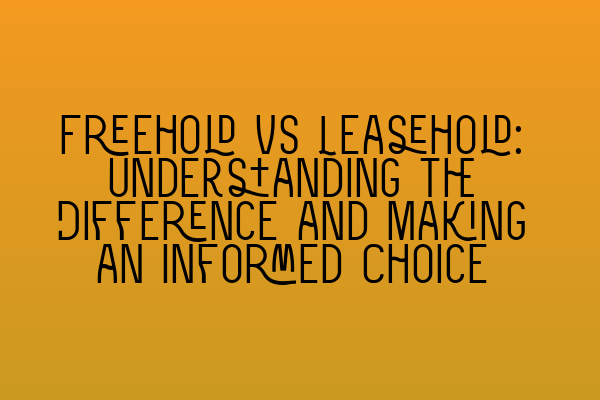Freehold vs Leasehold: Understanding the Difference and Making an Informed Choice
When it comes to buying a property, one of the most important factors to consider is whether it is freehold or leasehold. Both types of ownership have their advantages and disadvantages, and understanding the difference between the two can help you make an informed decision. In this article, we will delve into the intricacies of freehold and leasehold ownership, highlighting key distinctions and guiding you towards making the right choice for your property purchase.
1. Freehold Ownership
Let’s begin by discussing freehold ownership. When you own a property on a freehold basis, you have full ownership rights over the land and the building it sits on. This means that you are the sole owner and have complete control over the property. You are not bound by any time limitations or restrictions, making freehold the most straightforward form of ownership.
With a freehold property, you have the freedom to make any changes or improvements to the property, subject to planning and building regulations. You can also choose to sell or transfer the property without any restrictions, allowing you to maximize the value of your investment.
2. Leasehold Ownership
On the other hand, leasehold ownership is a different concept altogether. When you purchase a leasehold property, you are essentially buying the right to occupy the property for a fixed period of time. This fixed period is outlined in the lease agreement, which is a legal contract between the leaseholder (you) and the freeholder (the landlord).
Leasehold ownership typically applies to apartments, flats, and some houses, particularly in areas where land is scarce. While you have the right to occupy the property during the lease period, the ownership of the land remains with the freeholder. This means that you will have to pay ground rent to the freeholder as specified in the lease agreement.
3. Key Differences
Now that we have a basic understanding of freehold and leasehold ownership, let’s dig deeper into the key differences between the two:
– Duration: Freehold ownership is indefinite, meaning you own the property for an unlimited period. Leasehold ownership, on the other hand, has a predetermined lease period, which can range from a few decades to several hundred years.
– Responsibilities: As a freehold owner, you are responsible for maintaining the property and the land it sits on. For leasehold properties, the responsibility for maintaining and managing the building and communal areas often lies with the freeholder or a management company, in exchange for service charges.
– Permissions and Restrictions: With a freehold property, you have complete control over any changes or modifications you want to make to the property. Leasehold properties, however, may have restrictions on alterations, such as obtaining consent from the freeholder.
4. Making an Informed Choice
When deciding between freehold and leasehold ownership, it is essential to consider your long-term plans and objectives. If you value full ownership and autonomy over your property, freehold ownership may be the best option for you. However, if you are attracted to the convenience and affordability of leasehold properties, you need to carefully review the terms of the lease agreement and understand the associated costs.
Seeking professional advice from a property solicitor is highly recommended before making a decision. They can conduct thorough due diligence on the property, review the lease agreement, and provide guidance to ensure that your investment aligns with your goals.
In conclusion, understanding the difference between freehold and leasehold ownership is crucial in making a well-informed choice when purchasing a property. Both types of ownership have their pros and cons, and what suits one buyer may not suit another.
For more information on property law, contracts, and other related topics, you may find the following articles helpful:
– Misrepresentation in Contracts: Unveiling Deceptive Practices
– A Closer Look at SQE Contract Law Syllabus
– SQE Contract Law: Analyzing Landmark Cases and Influential Judicial Decisions
– Contract Law for Services: Key Considerations and Best Practices
– Understanding Contractual Capacity: Rights and Limitations
Remember, making the right choice in property ownership is essential for your long-term happiness and financial security. Take the time to analyze your options, consult professionals, and make an informed decision that aligns with your goals and priorities.
